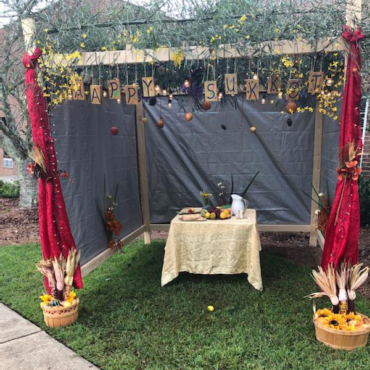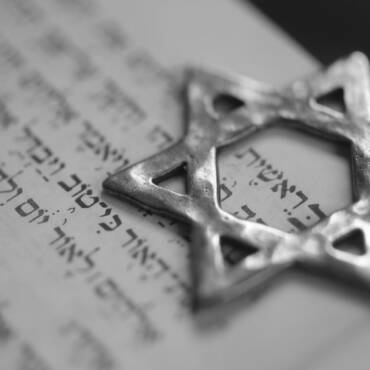The Uniqueness of Shavuot

Fifty Days after Passover…
Of the three major pilgrim festivals, Shavuot is unique. We read regarding this festival in Leviticus 23:15-17, “You shall also count for yourselves from the day after the sabbath, from the day when you brought in the sheaf of the wave offering: there shall be seven complete sabbaths. You shall count fifty days to the day after the seventh sabbath; then you shall present a new grain offering to the LORD. You shall bring in from your dwelling places two loaves of bread for a wave offering, made of two-tenths of an ephah (8 cups); they shall be of a fine flour, baked with leaven as firstfruits to the LORD.”
The name Shavuot (Pentecost) means the Feast of Weeks. The Greek word for Pentecost simply means fifty. It is also called the Feast of Weeks because that is how you know when to celebrate it. Unlike Passover and the Feast of Tabernacles, the Feast of Weeks is dateless. Shavuot is traditionally remembered as a time when God made Israel one people in the Law.
To celebrate Shavuot, you had to count “seven weeks” from the day after the Sabbath” of the Passover. The next day, the fiftieth day, would be Shavuot (Leviticus 23:15-16). Why don’t the Scriptures just give the date? In this fast-paced iPhone-controlled world we live in, we would have been inclined to say to Moses, “Forget counting fifty days, and just give me the date and I’ll show up for worship!” No, you had to count fifty days regardless of how busy your schedule might be.
Redemption in the Lamb of Passover
Israel was to count fifty days so that to celebrate Shavuot, they would never forget Passover. May it never be that Israel would reckon itself from the giving of the Torah and not from the true foundation of their life as a people at Passover.
Nevertheless, it was at Passover, not Shavuot when God redeemed us from bondage through the blood of the Lamb. Passover is to be the foundation and head of the year (Exodus 12:2). It celebrates Israel’s redemption from bondage, and redemption is the foundation of our salvation. Every year Israel counted the weeks from Passover to Pentecost, they remembered that their redemption as a people was found in the lamb of Passover.
We should Never Forget
We are never to forget our Messiah who gave His life for us, and the unspeakable riches of our new birth in Him. Like Israel’s redemption from bondage, our foundation of faith as believers in Messiah Yeshua is forever tied to Passover and our redemption in the Lamb of God. We are not firstfruits to God just because we celebrate a holiday, but when we look to Yeshua as the true foundation for our spiritual lives. Only then are we a firstfruits offering, for God’s use only.
Yeshua is our Strong Foundation
Every Shavuot, believers are compelled to remember Passover and the Passover Lamb, Yeshua. Though Pentecost is the ‘birthday celebration’ of the body of Messiah when the Holy Spirit came, we are never to look to the Holy Spirit as the foundation of our faith either individually or as a body of believers. Our security is experienced when we look to Yeshua as our foundation of faith. Our confidence is in the Lord and in Him alone! The Passover redemption of the believers reminds us each year that despite all that the world, the flesh, and the devil may throw at us, we are absolutely secure in Messiah. Yeshua is our strong foundation. He is the “author and finisher of our faith” (Hebrews 12:2).
Yield ourselves to the Lord
The ultimate fulfillment of the Shavuot firstfruits offering are New Covenant believers. When the Spirit of God came upon the Apostles in Acts 2, He made them into His firstfruits (James 1:18). Similarly, believers today are people of both privilege and responsibility to live faithfully for the Lord.
Through faith in Messiah we have eternal salvation and new life as children of God. What a privilege it is to have the enablement of the Holy Spirit (Ruach HaKodesh) to live dedicated and holy lives to the glory of God. Though there is “no condemnation to those who are in Messiah” (Rom. 8:1), there is chastening and discipline from the Lord for every child of His that we might grow in righteousness (Hebrews 12:6-8). As believers, we are to present ourselves for God’s use only.
Who are the final Firstfruits?
We experience His spiritual blessings when we yield ourselves to the Lord, and in living for Him, fulfill His purpose for us.
The final Shavuot firstfruits will be the 144,000 Jewish Tribulation believers: “these are the ones who follow the Lamb wherever He goes. These were redeemed from among men, being firstfruits to God and to the Lamb” (Revelation 12:4). Even during the darkest period of history, God will have His holy firstfruits as lights in the world to testify to all who believe.
Jew and Gentile as a Witness
Shavuot is a picture of the Body of Messiah including both groups: Jews and Gentiles. When the “fullness of Pentecost had come” (Acts 2), there was an open invitation to all who would believe to be saved. At Shavuot we are reminded that we are sinners without the Passover redemption. However, as we look to Messiah Yeshua, and His salvation we find cleansing of our sins and a new life in Him. Shalom.




Add Comment